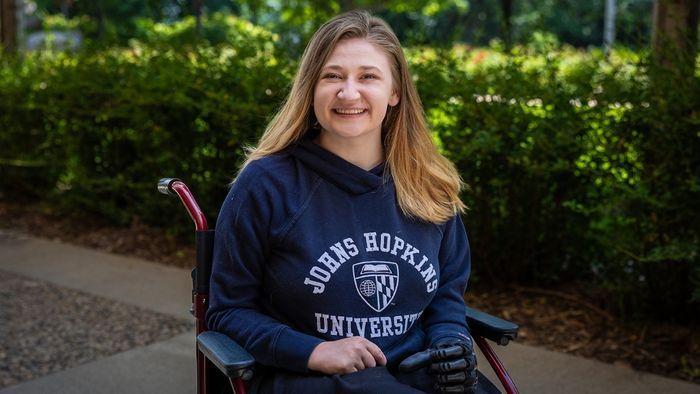On Christmas Eve 2003, 1-year-old Kate Ketelhohn was rushed to the emergency room. She had Step A—a bacterial blood infection. As a result, part of her left arm, portions of her right hand and parts of her feet had to be amputated to save her life. Her family eventually traveled from their home in Wisconsin to seek care at Gillette Children’s to help Kate reach her potential.
Kate is now a senior studying pre-med at Johns Hopkins University in Baltimore, Maryland. She spent her summer applying to medical school with the hope that she can become a pediatric rehabilitation medicine physician (PM&R). Her goal is to help the next generation of children who, like her, are working to achieve their dreams. Kate shares her tips to help students who have health issues have a successful college experience.
College was the first time I lived on my own. I was never the kid at sleepaway summer camps or going on solo trips. I had my home set up the way that worked for me, and my family supported me so seamlessly that I didn’t always notice. I would need to build everything bottom up for college.
One: not everyone is familiar with disability and the complexities that it can involve.
When I labeled myself as an ambulatory wheelchair user, my accommodations changed to the ADA default for wheelchair users, which was actually more difficult for me to use as was noted by my physical therapist in my accommodation request. College can put you in a bucket of what people think your disability is. If that works for what you need, that’s great. If your disability needs aren’t as easy to categorize, work with your family and medical team to figure out what you would need to succeed. You will often be the local expert on your disability.
Two: College accommodations are different from high school accommodations.
Colleges can use different terms for same or similar accommodations, and for me. I didn’t need to ask for approval for living accommodations (unless you count me asking my mom to support me as I went up stairs). I learned these differences the hard way when the fire alarm went off in my dorm when I was studying. It took me a week to physically recover from the drill because I hadn’t known that being notified of fire drills in advance was an accommodation I could have.
Three: Have backup plans
I use prosthetics to walk, so I made note of the nearest prosthetist and brought old prosthetic feet in case they broke (which I did end up needing). If you use mobility devices, what would you do if one breaks? What if the backup doesn’t work?
Four: Don't be afraid to speak up
Not everyone is aware of your accommodations, and sometimes people might forget them. If it’s an accommodation approved by the school and teacher, then it is required to be implemented. If a teacher or staff member denies an accommodation, talk to disability services and potentially your family for what your options may be. Also, this doesn’t have to be with your official accommodations and in class. I request seating at social events. I will be honest— this has not always been provided, but I eventually found a group of friends who support me and my disability needs.
 Home Page
Home Page

